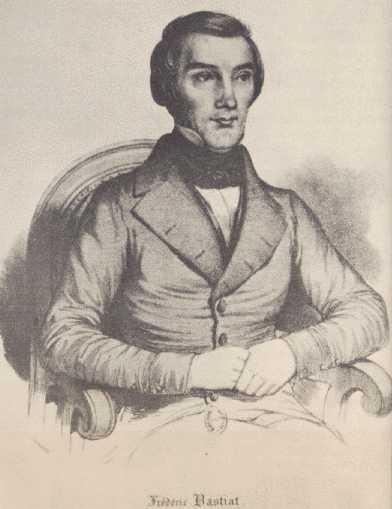Liberty Matters
Does Bastiat Appeal Only to the Young?

Robert Leroux's follow-up essay quotes Bastiat's accusation (from the FEE edition of Economic Harmonies) that the socialists of his day "draw it all, men and things alike, out of their own heads. They dream up a social order not connected with the human heart; then they invent a new human heart to go with their social order."
Plus ça change, plus c'est la même chose. Although today's advocates of top-down state control of individuals and society choose, for good marketing reasons, not to call themselves socialists, early 21st-century "Progressives" share with mid-19th-century socialists the hubris that they can consciously mold the human character and society's order very much like a potter molds inert clay.
When I was in law school at the University of Virginia (1989-1992), I daily saw this "Progressive" hubris on full and flashy display, especially among my fellow students. Too many of them were in law school neither to learn what the law is nor to learn about the processes and institutions that give rise to law. No. They were in law school because they were aspiring legal central planners.
These students unthinkingly presumed that society requires a planner - a molder - whose will and intelligence guide his hands and his tools to form social order out of chaos. Law, therefore, was for these students that collection of commands issued by society's molder. And there was no question for these students that without this molder of laws, law either would not exist or would be a randomly assembled mess of haphazard rules with no internal coherence.
The chief issue, then, for these students was who would be society's molder. My fellow students, of course, fancied themselves in this role. They viewed law school as providing them with the practical training they'd need on how best to use the available machinery to mold the hapless masses into appropriate social shape.
The idea of spontaneous social, economic, and legal order was completely foreign to these students.
I - having already earned my doctoral degree in economics - beheld this ignorance of my intellectually arrogant fellow students with a combination of bemusement and terror.
From time to time, though, I would do more than observe; I would challenge this or that student to reconsider his or her premises. And on one very memorable occasion, I explicitly relied on Bastiat.
One student (call him Sam) was surprised to learn of my opposition to his idea for a new government program to employ all the soldiers who were destined to be discharged into the civilian workforce because of the end of the Cold War. "Who's going to employ all of these people?" Sam asked rhetorically.
In response - for I refused to treat his question as rhetorical - I summarized Bastiat's argument in "What Is Seen and What Is Unseen." A day or two later I copied the essay and gave it to Sam for him to read - which he did. We then resumed our conversation.
At one point during the talk we had after he'd read Bastiat's famous essay, Sam surprised himself by granting many of Bastiat's points. I remember thinking, for a few minutes, that I (or, rather, the ghost of Bastiat) had gotten through to him. Alas, neither Bastiat's ghost nor I did any such thing. Sam quickly shook off his encounter with Bastiatian economics and, recovering his "Progressive" senses, insisted that I was "naïve to imagine" that private entrepreneurs and firms would have sufficient foresight, gumption, and resources to find ways to profitably employ large numbers of discharged military personnel.
But… But… At least Bastiat's ghost and I did make Sam think Bastiat-like if only briefly. Too short a time, it's true. But for a few minutes, that understanding was beginning to infiltrate Sam's thoughts.
I often think back to my conversations with Sam. I wonder what would have happened if he had encountered Bastiat earlier - say, when he was a freshman or sophomore at Brown University. By the time Sam got to law school, already 23 years old, his mind had been incurably blinded to the unseen.
I had the good fortune to be introduced to Bastiat's writings when I was only 18 years old. Reading Bastiat at that tender age had a huge impact on me, one that remains among the most significant of my life. Why? Is Bastiat best read by minds that are still largely blank slates? Do Bastiat's clarity and humor subtract power from his prose when read by people, such as Sam, who fancy themselves intellectually sophisticated? How should Bastiat's arguments be introduced to market skeptics to ensure that those arguments receive the best hearing possible?
In short, why is this economist of unmatched stylistic oomph! and seldom-matched substantive rigor still known only to a far-too-small circle of people?
Copyright and Fair Use Statement
“Liberty Matters” is the copyright of Liberty Fund, Inc. This material is put on line to further the educational goals of Liberty Fund, Inc. These essays and responses may be quoted and otherwise used under “fair use” provisions for educational and academic purposes. To reprint these essays in course booklets requires the prior permission of Liberty Fund, Inc. Please contact oll@libertyfund.org if you have any questions.